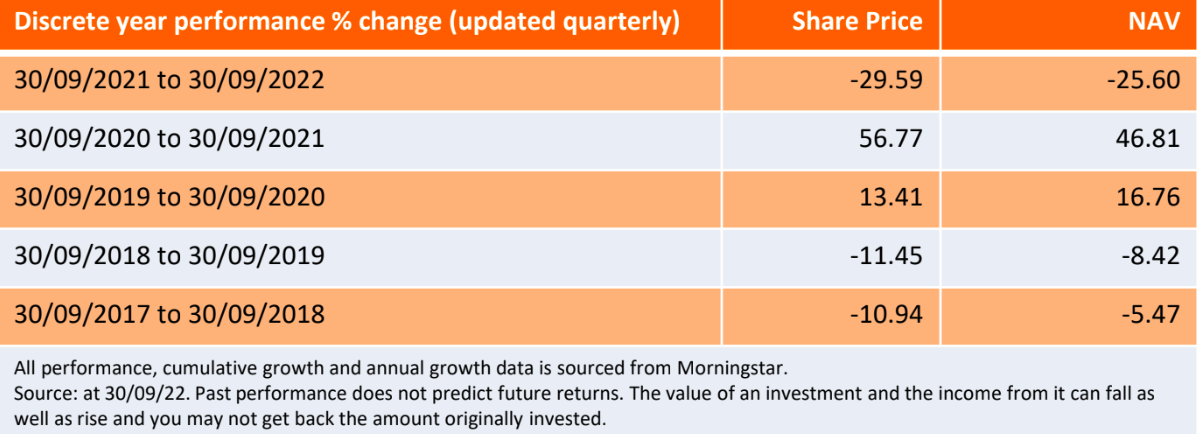
Investment Environment
European equities declined as persisting inflation concerns and energy prices fuelled investor anxieties about a severe recession. The European Central Bank (ECB) raised interest rates by 75 basis points (bps) -its largest ever increase -to 1.25%, which supported some banking stocks.¹
Portfolio Review
The Company underperformed the MSCI Europe Small Cap ex UK Index during the month.
Despite a weak economic backdrop, corporate results remained encouraging with strong sales growth tending to offset margin pressure in many market segments. Our top performers were BFF (Italian bank and factoring company), Van Lanschot (Dutch bank and wealth manager) and Criteo (marketing technology). BFF has been benefiting from the factoring market returning to the structure that existed before the huge state-funded, Covid-19 support measures. Van Lanschot also delivered better-than-expected results and continued to deliver high shareholder distributions from excess capital. Criteo also saw strong underlying product growth trends and although there are a few headwinds, we see continued fundamental value for the company.
Detractors from relative performance were stock specific. DFDS declined due to the weaker economy and its perceived cyclicality. However, we still see strong data points that support the Mediterranean business and positive price increases for goods crossing on the English Channel. Another detractor, Renewi, also declined as the demand for industrial waste decreased.
In terms of activity, we opened a new position in Duerr as the company has seen increased demand this year. It has a large order backlog, and we believe the easing of lockdowns in China could result in continued momentum for later in the year. We financed the new purchases through the disposal of stocks, namely Boskalis after the firm was bought out and converted to a private company. We think there is considerable value in the public markets now and expect trade buyers and private equity to take advantage of this once the debt markets have become more orderly and willing to price risk. This will be more likely once inflation has begun to decline and the extent of any recession is understood. We think we are closer to that point than the market currently assumes.
Manager outlook
The future is always an uncertain place and currently there are several different driving factors that are hard to judge. With that caveat, we believe that inflation is close to peaking with freight rates normalising, energy prices down from highs and as supply-chain blockages begin to clear. We think rising interest rates and the energy shock in Europe will likely drive a recession, though the severity of this might not be as bad as the market seems to fear.
Overall, we think that energy prices will be structurally higher than they were pre-Covid, more due to the lack of an oil and gas capital expenditure (capex) cycle than other factors, but clearly the flow of Russian energy into Europe will be an important factor should it ever return. The green transition will also demand a significant energy capex cycle. Company management teams will also be cautious about persisting with brittle supply chains dependent upon authoritarian regimes in Asia. We think there will be capex to come around near shoring and warehouse automation. The disinflationary drivers of the post-Global Financial Crisis, pre-Covid world look to be at an end, and we believe moderate inflation and interest rates will be a persistent factor in times to come.

Trust article
1Source:Bloomberg as at 30th September 2022
Capital expenditure (CAPEX) – Capital expenditures (CapEx) are funds used by a company to acquire, upgrade, and maintain physical assets such as property, plants, buildings, technology, or equipment. CapEx is often used to undertake new projects or investments by a company.
Cyclical stocks – Growth investing Companies that sell discretionary consumer items, such as cars, or industries highly sensitive to changes in the economy, such as miners. The prices of equities and bonds issued by cyclical companies tend to be strongly affected by ups and downs in the overall economy, when compared to non-cyclical companies.
Inflation – The rate at which the prices of goods and services are rising in an economy. The CPI and RPI are two common measures.
Recession – A recession is a macroeconomic term that refers to a significant decline in general economic activity in a designated region.It had been typically recognized as two consecutive quarters of economic decline, as reflected by GDP in conjunction with monthly indicators such as a rise in unemployment.